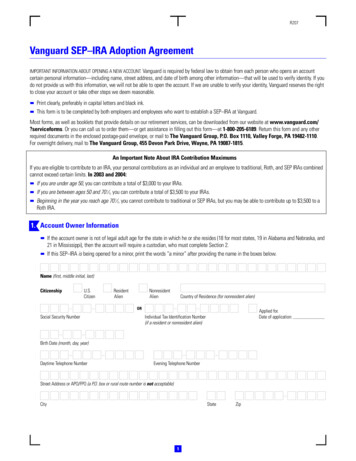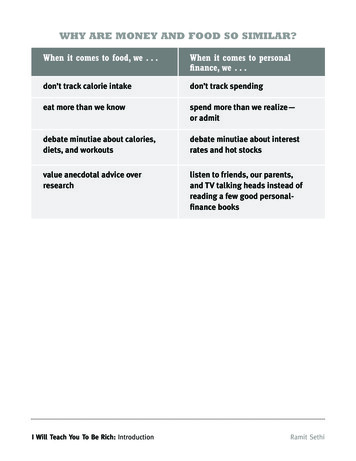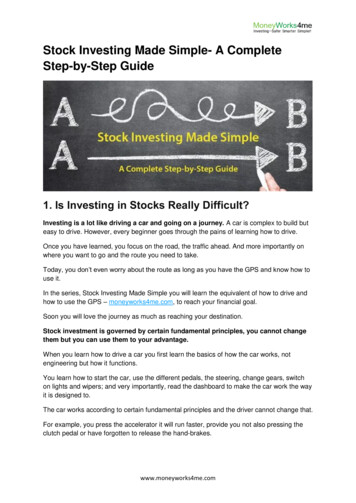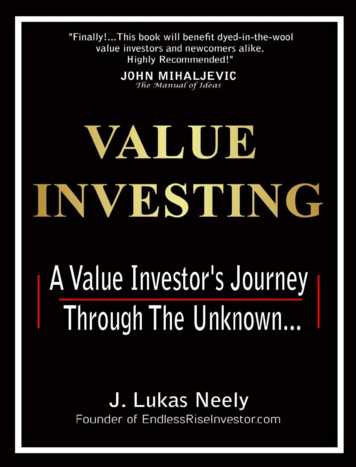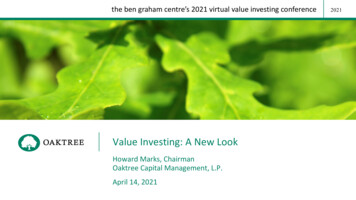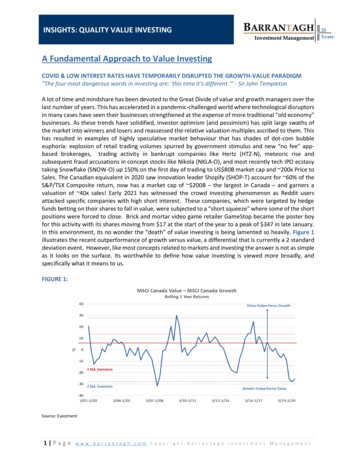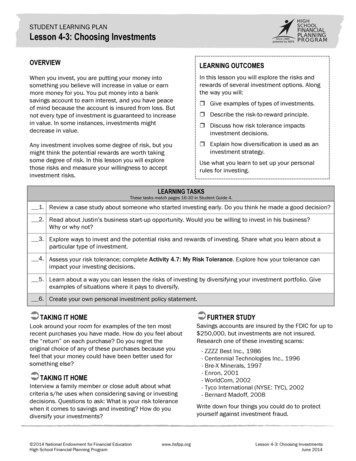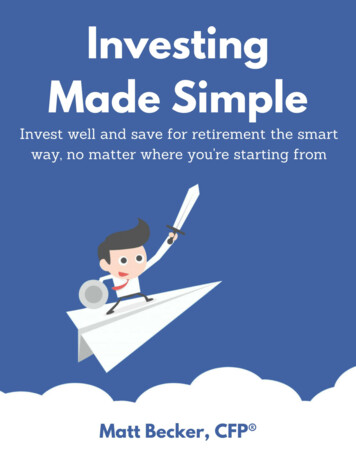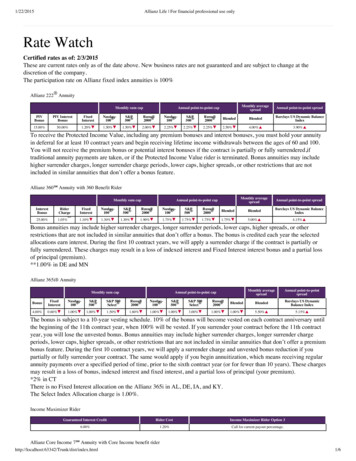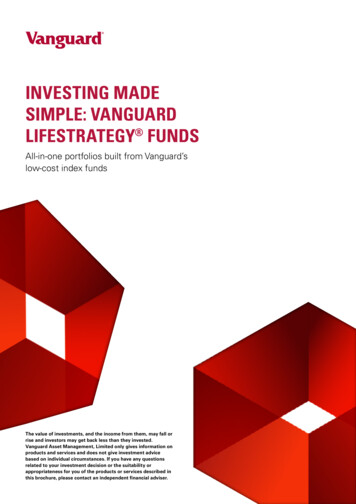
Transcription
INVESTING MADESIMPLE: VANGUARDLIFESTRATEGY FUNDSAll-in-one portfolios built from Vanguard’slow-cost index fundsThe value of investments, and the income from them, may fall orrise and investors may get back less than they invested.Vanguard Asset Management, Limited only gives information onproducts and services and does not give investment advicebased on individual circumstances. If you have any questionsrelated to your investment decision or the suitability orappropriateness for you of the products or services described inthis brochure, please contact an independent financial adviser.
Vanguard Asset Management.As part of the Vanguard Group Inc, VanguardAsset Management Limited draws on over45 years of investing experience.We aim to treat investors fairly and to offerlow-cost, uncomplicated investments designedto help individual investors achieve theirinvestment goals.You will find a glossary of key terms at the endof this guide.100%80%60%40%220%
Sophisticated portfoliosin a straightforward packageLife is risky and complicated enough, so we’ve triedto make the LifeStrategy funds straightforward andeasy to understand. It’s also why we’ve built our allin-one funds using simple index-tracking funds as theunderlying components. Our research1 shows thatindex funds tend to be less volatile than active funds.The fact that index funds generally operate with lowercosts than actively managed funds also means we canoffer them at a low cost.The funds combine over 45 years of Vanguard’s indexinvesting experience with its expertise on constructingportfolios of different investments.In other words, the funds are all-in-one solutions thatbenefit from our investment experience, deliveredat the low-cost level that investors have come toexpect from Vanguard. You pick the fund that is rightfor your circumstances and we’ll take care of the rest,leaving you to focus on the things that matter to you. We believe investment companies should manage theirfunds exclusively in the interest of their investors. Thisis the only way to be truly aligned with your investors. Sean HagertyManaging Director, Vanguard1 The case for low-cost index-fund investing, Dr.Jan-Carl Plagge et al. 2020. This research is not available to personal investors for regulatory reasons.3
Investment expertiseIt seems that the world keeps getting busier,with more demands on our time every day.Who has the time, knowledge or resourcesto create or look after a varied portfolioof investments?Now there’s a solution: a range of fivestraightforward investment portfoliosfrom Vanguard, one of the world’slargest and most well-respectedinvestment managers.4
Investing made simpleBroad global mix of investments keeps yourportfolio diversifiedThe funds invest internationally for you across several key investmenttypes, allowing you to participate in the stronger-performing assetswhile helping to offset the impact of weaker-performing ones.Low cost means you keep more of yourinvestment returnsUsing Vanguard’s low-cost index funds as building blocks means that thefunds deliver a sophisticated all-in-one portfolio at a relatively low cost. Whencosts are lower, you get to keep more of your investment returns.Expert fund managers maintain the portfolios,so you don’t have toVanguard’s investment experts look after the portfolios for you and make sure theydon’t drift out of line with their target balance of equities and bonds. This means thatyou always know what is in your portfolio and can rest assured that the balance ofequities and bonds is as expected.5
The funds at a glance:Vanguard LifeStrategy funds include a family ofportfolios with different levels of potential riskand return. Each fund offers a diversified blendof stockmarket equities and bonds, built usingVanguard’s underlying cost-efficient index funds.They provide professionally constructed anddiversified portfolios designed to help you meetyour goals, whatever your attitude to risk.LifeStrategy 20% EquityFundLifeStrategy 40% r shorter term investing(3-5 years)* and investorswith less tolerance for riskAbout equitiesand bondsEquities represent a share ofownership of a listed public company. Theytrade on a stock exchange and the price canbe quite volatile on a daily basis. Bonds, onthe other hand, represent a promise by agovernment or company to pay a certainamount of interest over a given period andto repay the sum borrowed at the end of theperiod. The chart on page 8 shows how equitiesand bonds have behaved over 100 years, butremember that past performance is nevera useful predictor of future returns.LifeStrategy 80% EquityFundLifeStrategy 60% EquityFundLifeStrategy 100% EquityFundBonds20%Bonds40%Equities60%For medium to longer term investing(5 years) and investors with a moderatetolerance for riskEquities80%Equities100%For longer term investing(10 years) and investors witha higher tolerance for risk*Vanguard believes that anything less than a three-year time horizon is saving, not investing. We did not design these funds for investorswith less than a three-year time horizon.6
Equities and bonds –what do they do?No doubt you’ve heard there’s no reward without risk.That’s as true of investing as it is of anything else inlife. You can’t control what happens in the markets, butunderstanding the historical patterns of equities andbonds can help you handle risk in your own portfolioand to select the right LifeStrategy fund for you.Getting the balance right for youAchieving long-term financial goals means acceptingthe trade-off between risk and reward, and appreciatingthe historical characteristics of different typesof investment.Equities, over the last twenty years, have offeredhigher long-term returns than bonds, but they’ve alsotypically carried more short-term risk (see overleaf).But always remember that historical returns arenever a reliable predictor of future results. The valueof investments, and the income from them, mayfall or rise and investors may get back less thanthey invested.The mix of equities and bonds that you choose willdepend on how much risk you’re willing to take. Andthat depends on why you’re investing, and when youneed your money.The risk /return erpotentialshort-termriskBONDSCASH IN YOUR BANK ACCOUNT7
happen in the future, since past performance is nevera predictor of future returns.Understanding the historicalrisk-return trade-offEveryone is different so you need to think about howmuch investment risk you are willing and able to takeand still sleep at night.The graph shows the long-term relationship betweenrisk and return for diversified equity/bond portfolios.While a higher allocation to equities has resulted insome much bigger gains, it also shows bigger losses.Of course, that doesn’t necessarily mean that this willAnnual returnsBest, worst and average returns for various equity/bond allocations over 100 0145.0%40/608.7%-52.6%100/0Past performance is not a reliable indicator of future results.Notes: Reflects the maximum and minimum calendar year returns, along with the average annualised return, from 1901-2020, for variousstock and bond allocations, rebalanced annually. Equities are represented by the DMS UK Equity Total Return Index from 1901 to 1969;thereafter, equities are represented by the MSCI UK. Bond returns are represented by the DMS UK Bond Total Return Index from 1901– 1985; the FTSE UK Government Index from Jan 1986 – Dec 2000 and the Bloomberg Barclays Sterling Aggregate thereafter. Returnsare in sterling, with income reinvested, to 31 December 2020.Source: Vanguard.8
Diversification: a broad mix canreduce riskIn order to reduce your risk, you need to diversify –that is, spread your portfolio across a broad mix ofassets. Diversifying your portfolio can help smoothout market ups and downs: so returns from betterperforming assets help to offset those that aren’tperforming so well.Investment markets move in different cycles, reflectingthe underlying strength of the economy, industrytrends and investor sentiment. Individual assets alsomove differently according to external factors. So forexample, during hard economic times many peoplewill stop buying luxury items and companies that makethem might experience a fall in sales, but makers ofessential items, like food, may not.The LifeStrategy diversificationadvantageThe role of index fundsVanguard LifeStrategy funds are built using our rangeof low-cost, uncomplicated index funds, which holdall, or a broad sample of, the securities in the marketindex they track. This automatically ensures the risk ofa single security is minimised within the portfolio.Ensuring a broad mixThe equity portion of each of the funds includes adiverse array of securities from across the globe,helping to offset any potential weakness in a singleregion or country. The bond portions include a carefulmix of global bonds, UK inflation-linked bonds,UK government bonds and UK investment gradebonds. Together these blends provide a high level ofdiversification, one that would be very difficult andcostly to achieve by individual investors buying singleindex funds.9
Keeping portfolios on trackOvercoming the problem of driftOver time, different assets perform differently. Thismeans that investments that perform well will grow asa percentage of the portfolio, while those that performpoorly will shrink. Left uncorrected, this drift may meanthat you end up with more (or less) risk than originallyintended. To ensure the portfolio aligns with its targetrisk and return characteristics, it must be periodicallyrebalanced to its original target.Vanguard LifeStrategy funds help you by sticking tothe target blend of equities and bonds without havingto continuously monitor and manually rebalance theportfolio. This helps keep your portfolio on track.Guarding against return chasingSticking to the predetermined target also helps toguard against the tendency to chase returns by movinginto and out of the best and worst-performing sectorsbased upon recent past performance.Equities perform wellover a given period,which means that theportfolio is out of balancewith a lot more equitiesthan the investor iscomfortable with. Thefund manager sells someequities and buyssome bonds.A portfolio has a targetblend of 60% equitiesand 40% bonds.30%Bonds40%BondsThe portfolio returnsto its targetallocation thatmatches theinvestor’s desiredrisk/return profile.40%Bonds60%Equities70%EquitiesFor illustrative purposes only.1060%Equities
The importance of costsUsing a hypothetical example (which does notrepresent any particular investment), the graphillustrates the potential impact of costs on an initialinvestment of 10,000 over a 30-year period. Thisgraph assumes 6% average growth per annum whichis compounded year on year. As this shows, an annualmanagement charge (AMC) or ongoing charges figure(OCF) of 0.3% compared to an AMC/OCF of 1.2%could potentially lead to savings of 11,943 over a30-year period.Costs matter in investing because every penny youpay in charges comes out of your investment. Thelower the charges the more of the investment returnyou keep. Low costs mean you either end up withmore, or get to your goal faster, than you would withhigher costs.Growth of a 10,000 initial investment over a 30 year period, assuming 6% growth per annum 52,749 60,000Hypothetical portfolio value 50,000 40,000 40,806 30,000 20,000 10,000 nnual Management ChargeNote: This hypothetical example assumes an investment of 10,000 over 30 years. Annual compounding is used for both the assumptionof 6% average growth p.a. and the investment costs. Costs are applied to average annual growth of 6% for each year. As it is ahypothetical, this example does not represent any particular investment.Source: Vanguard.This example assumes a growth rate of 6%, but in reality returns may vary and you may get a lower return from a fund withlower investment costs.11
Low costs mean you keep moreVanguard focuses on low-cost, uncomplicated fundsthat give investors the best chance of achieving theirinvestment goals. That’s why we aim to provide thebest-value investment funds. With fund chargesset at 0.22%, we believe the Vanguard LifeStrategyfunds offer one of the most cost effective investmentsolutions available to UK investors.Annual management charge/ongoing charges figure*LifeStrategy 20% Equity Fund0.22%LifeStrategy 40% Equity Fund0.22%LifeStrategy 60% Equity Fund0.22%So, what do these costs mean?LifeStrategy 80% Equity Fund0.22%Annual management charge /ongoingcharges figureLifeStrategy 100% Equity Fund0.22%When you invest with any fund manager, you willhave to pay some running costs. These includean ‘ongoing charges figure’ which covers the fundmanager’s costs of managing the fund over the year.For further information about charges please seethe sections entitled “Buying Shares”, “RedeemingShares”, “Charges and Expenses”, ”Dilution Levy”and Appendix 1 of the Prospectus on our website atglobal.vanguard.com.12Vanguard LifeStrategy funds*Data as at 1 January 2021.
Why Vanguard?Vanguard is a different kind of investment company.It was founded in the United States in 1975 on asimple but revolutionary idea: that an investmentcompany should manage its funds solely in theinterests of its clients.Rather than being publicly traded or owned by a smallgroup of individuals, The Vanguard Group is ownedby Vanguard’s US-domiciled funds. Those funds,in turn, are owned by their investors. This uniquemutual structure aligns our interests with thoseof our investors and drives the culture, philosophyand policies throughout the Vanguard organisationworldwide. This is a philosophy that has helpedmillions of people around the world to achieve theirgoals with low-cost, uncomplicated investments.It’s what we stand for: value to investors.What sets us apartTransparencyWe focus on being clear on everything we do – thismeans communicating to you clearly about costs andcharges and how our products work – so you shouldalways know where you stand.FairnessVanguard takes a fair approach to costs – for example,how we manage our charges.Putting you firstThe Vanguard Group Inc.’s mutual structure andphilosophy means we can focus on clients’ needs overthe long term.Exceptional valueVanguard aims to offer the the highest value productsat very low costs and recognises that you deserve thebest deal possible.13
Key termsActive funds – An investment managementapproach where the manager selects securitiesfrom the investment universe prescribed by a fund’sinvestment objective. The goal of an actively managedfund is to beat, rather than simply match, the returnfrom a particular market index or benchmark.Annual management charge/ongoingcharges figure – The AMC/OCF covers the fundmanager’s costs of managing the fund. It does notinclude dealing costs or additional costs such asaudit fees.Assets, asset classes – A category of securitiesthat exhibit similar characteristics. Examples includeequities, bonds, cash or property.Bonds – A loan certificate issued by a government,public company or other body. The issuer agrees torepay the original amount borrowed after an agreedtime (when the bond matures). Bonds usually repaya fixed interest rate (known as the coupon) over aspecified time.Diversification – A strategy that helps to protectagainst risk by spreading investments across differentasset classes or sectors.Equities – Ordinary company shares. A stock orother security representing an ownership interestina company.Index fund – An investment fund that aims to closelymatch the returns of a specified market index. Thefund may hold all the securities in the particular indexor apply a mathematical model to purchase a sampleof securities that will perform as closely as possible tothe index.14Mutual or pooled fund – An investment vehiclewhere a number of individual investors pool theirmoney to invest in a professionally managed fund.Portfolio – A combination of investments held inone place. A portfolio is frequently created to meetparticular investment objectives, such as providingcapital growth or regular income.Risk – The chance that an investment’s actual returnwill differ from expectations. Risk comes in manyforms, including market risk (the chance that returnswill fluctuate) and shortfall risk (the possibility thata portfolio will fail to meet longer-term financialgoals). Investors should decide on their individualrisk tolerance and use this as a guide to buildingtheir investment portfolio.Risk tolerance, risk appetite, risk profile or risk/reward trade-off – The extent to which individualinvestors are prepared to accept volatility in theirinvestment portfolios in return for receiving potentiallyhigher returns.Securities – Freely tradable assets that are quoted onan exchange including shares, bonds and derivatives.Transaction costs – The costs involved in buying orselling equities, bonds or other securities.Volatility – The extent to which investments orinterest rates fluctuate over time.
15
Investment Risk InformationThe value of investments, and the income from them, may fall or rise and investors may get back less thanthey invested.Past performance is not a reliable indicator of future results.Any projections should be regarded as hypothetical in nature and do not reflect or guarantee future results.Some funds invest in emerging markets which can be more volatile than more established markets. As a resultthe value of your investment may rise or fall.The Vanguard LifeStrategy Funds may invest in Exchange Traded Fund (ETF) shares. ETF shares can be boughtor sold only through a broker. Investing in ETFs entails stockbroker commission and a bid-offer spread whichshould be considered fully before investing.Investments in smaller companies may be more volatile than investments in well-established blue chip companies.Funds investing in fixed interest securities carry the risk of default on repayment and erosion of the capital valueof your investment and the level of income may fluctuate. Movements in interest rates are likely to affect thecapital value of fixed interest securities. Corporate bonds may provide higher yields but as such may carrygreater credit risk increasing the risk of default on repayment and erosion of the capital value of your investment.The level of income may fluctuate and movements in interest rates are likely to affect the capital value of bonds.The funds may use derivatives in order to reduce risk or cost and/or generate extra income or growth. The useof derivatives could increase or reduce exposure to underlying assets and result in greater fluctuations of theFund's net asset value. A derivative is a financial contract whose value is based on the value of a financial asset(such as a share, bond, or currency) or a market index.For further information on risks please see the “Risk Factors” section of the prospectus on our website athttps://global.vanguard.com.Important InformationVanguard Asset Management, Limited only gives information on products and services and doesnot give investment advice based on individual circumstances. If you have any questions related toyour investment decision or the suitability or appropriateness for you of the product[s] described inthis document, please contact your financial adviser.This document is designed for use by, and is directed only at persons resident in the UK.The information contained in this document is not to be regarded as an offer to buy or sell or the solicitation ofany offer to buy or sell securities in any jurisdiction where such an offer or solicitation is against the law, or toanyone to whom it is unlawful to make such an offer or solicitation, or if the person making the offer orsolicitation is not qualified to do so. The information in this document is general in nature and does notconstitute legal, tax, or investment advice. Potential investors are urged to consult their professional adviserson the implications of making an investment in, holding or disposing of shares and /or units of, and the receiptof distribution from any investment.The Authorised Corporate Director for Vanguard LifeStrategy Funds ICVC is Vanguard Investments UK, Limited.Vanguard Asset Management, Limited is a distributor of Vanguard LifeStrategy Funds ICVC.For further information on the fund's investment policy, please refer to the Key Investor Information Document(“KIID”). The KIID and the Prospectus for the fund(s) is available from Vanguard via our websitehttps://global.vanguard.com/.Issued by Vanguard Asset Management Limited, which is authorised and regulated in the UK by the FinancialConduct Authority. 2021 Vanguard Asset Management Limited. All rights reserved. 02/21 3151483878Connect with Vanguard global.vanguard.com
Investing made simple Broad global mix of investments keeps your portfolio diversified The funds invest internationally for you across several key investment types, allowing you to participate in the stronger-performing assets whil
